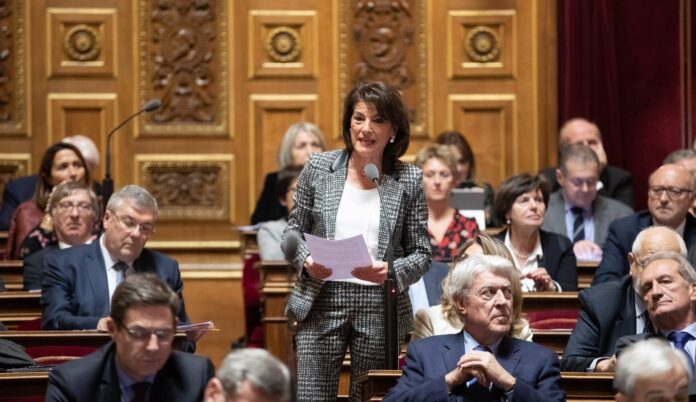Just days before the ministerial conference of the European Space Agency in Bremen, questions are mounting about the role France wants to play in the European space effort. Senator Dominique Estrosi Sassone questioned the government. She is asking for precise answers about the level of France’s financial commitment.
The new ministerial conference of the European Space Agency (ESA) is approaching. It must decide on the budget for the coming years and allocate the contributions of member states. In this context, France finds itself facing a risk of downgrading according to several industrial and political actors. Germany and Italy are expected to invest around five billion and four billion euros, respectively. France, on the other hand, would only contribute just over three billion. This prospect is causing concern in the industry, notably in Cannes, where Thales Alenia Space is located.
Dominique Estrosi Sassone therefore addressed the Minister of Higher Education, Research, and Space during the government’s current affairs questions. She wants to obtain the exact amount of the French contribution. She also asks that the government clarify its position, as the Bremen conference is scheduled to take place in the coming days, on November 26 and 27.
In her question posed on Wednesday, November 19, the senator refers to the speech by the President of the Republic on the space strategy for 2040. She states: “When listening to the President of the Republic presenting his space strategy for 2040 last week, I thought of Alain Delon… and especially Dalida: ‘Words, words, more words, magical words, tactical words that sound false…’” The senator believes that the announcements are not accompanied by sufficient financial commitments.
She continues: “because the ‘caramels, sweets, and chocolates’ offered to the French space industry do not mask the harsh financial reality of the negotiations to be completed next week at the ministerial conference of the European Space Agency, which is planning a significantly increased budget.”
Her argument is based on a comparison between the announced contributions by other countries. “Our country, a historical leader in Europe since General de Gaulle, is about to be outpaced by Germany and Italy, each investing five and four billion euros. According to the latest news, France will not be able to keep up with these countries with better-managed public finances. It would contribute only a little over three billion.” She also warns of the industrial risks: “If France invests less than €4.5 billion, the French space industry could suffer from reduced geographic returns to the detriment of its industries and territories.”
The senator concludes her question by asking: “Mr. Minister, what will be the amount of the French contribution to the ESA budget? Will France remain a leader or will it fall to the second division?”
Philippe Baptiste: “Space is an essential element of our strategic autonomy”
The French Minister of Higher Education, Research, and Space, Philippe Baptiste, responded by recalling the importance of the space sector for defense, science, and strategic autonomy. “Space is indeed an essential element of our strategic autonomy, a pillar of our Defense. It’s a pillar of Science, for earth observation, understanding climate changes.”
The minister emphasizes the existing capabilities. He argues that France has Ariane 6, CNES, and an active network of companies. He also highlights the need for a European ambition. According to him, the ministerial conference has not yet finalized its figures: “As for the ESA ministerial conference, it’s too early to answer your question. Discussions start today, and the figures you mentioned for the investment levels of our German and Italian partners are not yet stabilized. No one has announced their contribution figures yet.”
He finally recalls the national commitment, quoting the presidential speech: “I refer you to the speech by the President of the Republic, who announced both an ambition and a figure: 16 billion euros by 2030 for civilian space apart from military expenses.”
In her follow-up, Dominique Estrosi Sassone criticizes the government’s budgetary choices, stating: “The truth hidden in your response and the decision against the space industry and more broadly against research is that the government you belong to prefers to spend more than two billion euros on suspending pensions rather than investing and preparing for the future. She adds: here in the Senate, we do not give up controlling the deficit and debt to regain financial flexibility. We want France to remain in control of its destiny.”
This debate highlights the tensions surrounding the French space policy. It sheds light on a budgetary, industrial, and strategic issue just days before a decisive conference for the future of European cooperation in this field. France, Germany, and Italy need to specify their commitments. The industry awaits guarantees. The government refers back to the negotiation process. The debate, however, remains open.


